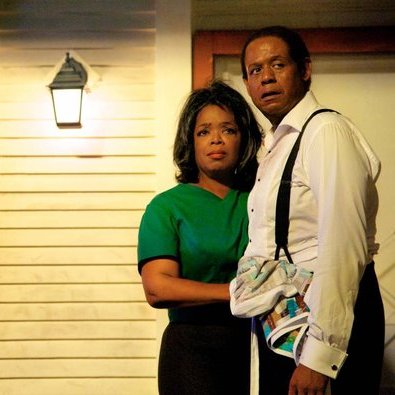'Lee Daniels' The Butler': Sets the Table for ContemplationBy Michael S. Goldberger, iBerkshires Film Critic
04:05PM / Friday, August 23, 2013 | |

Popcorn Column
|

Weinstein Company
The life of Cecil Gaines (played here by Forest Whitaker, with Oprah Winfrey) plays out against the turmoil of the civil rights movement and his post in the White House. |
It is astutely illustrated in "Lee Daniels' The Butler" that you cannot separate American history from the annals of African-American slavery, subjugation and the ongoing exodus that plays out in our daily domestic life. The sins of the past, born of an ignorance predating ancient times, shamefully wraps around the spine of our humanity like a cancer.
The search for a cure to our social ills, a work in progress, is touchingly told here via the compelling saga of Cecil Gaines (Forest Whitaker), butler to eight U.S. Presidents. A long-durable form for chronicling the events and movements of time, this mode, albeit simplifying, gives the complex panorama accessibility. Whatever might be lacking in an academic sense is shored up on the emotional end by several, convincingly heartfelt performances.
Forest Whitaker excels in the title role, a metaphoric witness to the persecution whose intermittent narrations complement an award-worthy embodiment of what it takes to survive in an environment so blinded by its prejudices that it barely recognizes them. Cecil's odyssey from virtual slavery on a cotton plantation in the South to a position of responsibility and tacit influence in the White House elicits a spectrum of emotions.
We are again shocked by the sheer physicality of the ugly violence, from out and out lynching to the brutal reprisals that attend protests, demonstrations and sit-ins. We know exactly what he means when James Marsden's JFK, watching the cataclysm on TV, disbelievingly declares, "I don't know what country I'm watching."
Daniels, working from a script by Danny Strong, inspired by Wil Haygood's article, skillfully balances a commentary on the major turning points, punctuated by actual footage, with a cerebral contemplation on the arduous road to real freedom. But where he excels most, thanks to Whitaker's tour de force, is in depicting what Cecil describes as the two faces the black man must wear if he is to make his way in America.
Numerous other points are made — historically, psychologically and in the realm of socioeconomics — as the milestones in Cecil's life are superimposed and analogized by the greater pageant of our civilization. Hypocrisy confounds. The duplicity, even in the name of equality, is astounding. A running example seriocomically mirrors the greater problem at hand: With each succeeding administration, Cecil vigilantly sallies forth, petitioning for equal remuneration and opportunity for the black White House staff.
It's also a love story, and a pretty good one at that, thanks in great part to Oprah Winfrey's marvelous portrayal of Cecil's wife, Gloria. Watching as she shares the trials and tribulations foisted upon them, and tossing in some personal devils of her own for good measure, we are reminded what a fine actress she is. We also take a little lesson in how the wiles, ravages and vagaries of world events impact a marriage. i.e. — child-rearing in a bigoted, strife-torn environment.
Their eldest son, Louis, played by David Oyelowo, becomes an activist while at Fisk University, whereas Charlie, portrayed by Elijah Kelley, opts for the military. Reading between the lines gives you a glimpse of the parental woes this augurs.
While both Winfrey and Whitaker exact enough dimension from their characters to occasionally loosen matters with a bit of comedy relief, the turnstile procession of Cecil's employers imparts a near cynical whimsy to the doings.
Robin Williams is Dwight D. Eisenhower, the first in the group to carve a notch for civil liberties. John Cusack's Nixon is the tragically paranoid opportunist; Liev Schreiber depicts Johnson as an ill-mannered boor who, despite his disregard for Emily Post, passes more civil rights legislation than anyone since Lincoln; and Alan Rickman captures Reagan as a personally nice but rather deluded, near doddering chief executive.
But Marsden's John F. Kennedy falls short, literally and figuratively. A full two inches less in stature than our 35th president, he looks and seems more like Bobby. Still, when that terrible moment comes, you feel the pang of opportunity lost, and there I was again, seated at my desk, senior year in high school, the shocking news coming over the loudspeaker.
Director Daniels is good at that ... lassoing the big events and telling them through the viewpoint of the common man just trying to realize his entitled portion of life, liberty and the pursuit of happiness. Problem is, thanks to the Catch 22 of intolerance, most of those who really need this education will not attend. Too bad. Because in experiencing the sublime grace and powerful conviction with which "Lee Daniels' The Butler" serves up its personalization of history, one just might gain a better understanding of racial injustice in America.
"Lee Daniels' The Butler," rated PG-13, is a Weinstein Company release directed by Lee Daniels and stars Forest Whitaker, Oprah Winfrey and David Oyelowo. Running time: 132 minutes
|

 MEMBER SIGN IN
MEMBER SIGN IN
 MEMBER SIGN IN
MEMBER SIGN IN